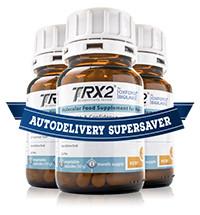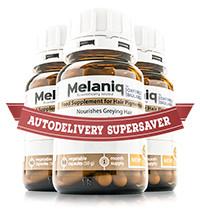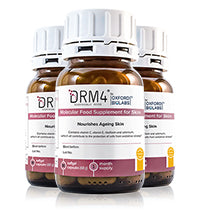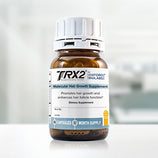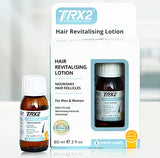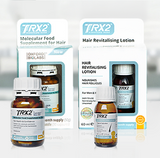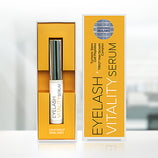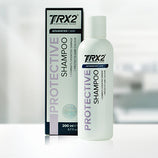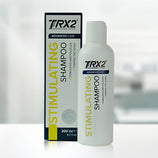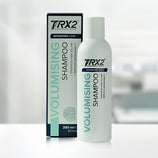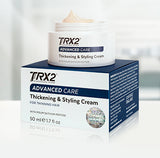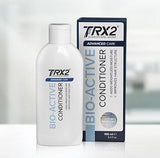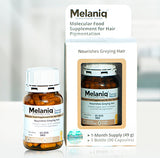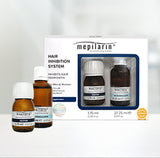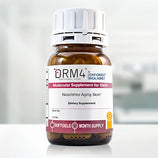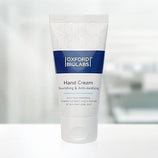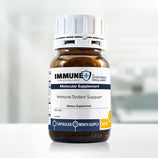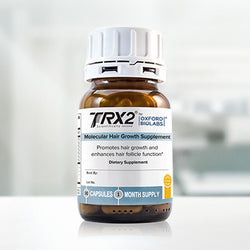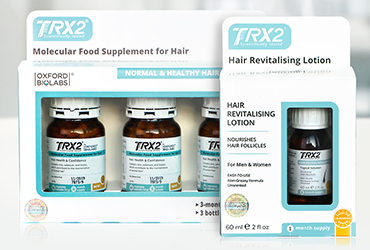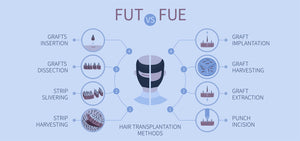How Iron Supplements Benefit Hair
Of all the pills and vitamins available to help one's appearance, iron supplements for hair might be the best. The benefits for hair and body are well-documented, with multiple clinical studies performed over the years. It’s an essential nutrient, required by the body for proper function, but many people simply don’t get enough.
However, iron shouldn’t be taken lightly. Unlike some other vitamins, it is possible to take too much, and do more harm than good. This extensive guide to iron supplements will show how they work and how to use them correctly.
The Link Between Iron Deficiency and Hair Loss

Iron deficiency is a known factor in hair loss, or alopecia. The science is thorough and very well-established on this point, with multiple studies having been published from the United States all the way to Iran.
There are several reasons why this nutrient is so critical for healthy hair growth, and why an iron deficiency can quickly lead to thinning hair or even baldness.
- Hemoglobin, a major component of blood, is composed largely of metabolised iron. Hemoglobin is what allows blood to carry oxygen around the body. Oxygen deprivation to the scalp is one of the most common direct causes of hair loss.
- Iron also aids in nutrient transport throughout the body, helping other vitamins, minerals, and compounds get to where they’re most needed. Without enough iron, cells begin to starve and shut down, unable to maintain their normal function.
- Iron is also a vital part of ATP synthesis, the process by which our cells create more adenosine triphosphate. ATP is known as “the energy currency of the cells”, and it allows cells to transfer energy between each other, separately from nutrient delivery. The chemical reactions that make up our cellular functions are driven by ATP, and without iron, they wouldn’t happen. Cells literally run out of fuel, as the body is unable to supply them with the substances they need to survive.
- Finally, hair is a noncritical function of the body. Iron is needed by every organ and every cell. An iron deficiency can cause a myriad of health issues up to and including death, as detailed below. When there’s a shortage of any critical nutrient, the body naturally directs its resources to where they’re most needed. Put simply, the body prioritises life functions like the heart, lungs, and liver over hair growth. Given the choice between going bald and literally dying, the body chooses to let the hair fall.
So how much iron is enough and how does one know if they are deficient?
Causes of Iron Deficiency
Surprisingly, there are a large number of potential causes of iron deficiency. It’s the most common nutritional disorder in the world, with over 2 billion people suffering from anemia.
- Malnutrition is, of course, one of the most common causes. Iron is primarily taken in through food sources as detailed below, and in food insecure areas of the world, it’s not a sure thing that people will eat enough iron to meet their needs.
- Inadequate diet, meaning people who eat enough, but eat the wrong things, is also a major cause of iron deficiency. Vegetarians and vegans are especially prone to this, as meat is an important source of several important nutrients.
- Blood loss can easily lead to anemia, since iron is primarily found in the blood. In women, especially heavy menstrual bleeding is a real risk factor, which is why many popular women’s multivitamins are supplemented with iron.
- Counterintuitively, excessive exercise can also lead to iron deficiency. Professional athletes are prone to the disorder as they lose iron through sweat and urine, through burst blood vessels resulting from high-impact sports, or even through gastrointestinal bleeding resulting from the long-term stress of endurance sports like cross-country bicycle racing.
-
Certain medications also cause iron loss, including those meant to treat high cholesterol and acid reflux, as well as some antibiotics. Some vitamins and herbal supplements, particularly those containing vitamin A, also cause iron loss or interfere with iron absorption.
If there is a suspicion of iron deficiency, contact a doctor or other medical professional. They can best advise on how to proceed safely.
How Iron Pills Work in the Body
Optimally, people carry 4-5 grams of iron in their bodies. That’s 50 mg per kg of body weight for men, or 38 mg per kg of body weight for women. Over half of this iron is generally in use by the bloodstream, in the form of hemoglobin.
Unused iron is stored in the body in the form of ferritin, a protein that resides in the liver. When our bodies start to run low on iron, it’s the ferritin reserves that are depleted first, followed by hemoglobin, and finally the iron currently in use by our cells.
When ferritin reserves start to drop, that’s also when hair loss begins. It’s not until hemoglobin begins to deplete that the average person sees other symptoms.
So, even a minor case of iron deficiency can result in hair loss or alopecia. It’s entirely possible for a person to be just deficient enough that they lose hair, without suffering the more obvious and life-threatening effects of this common condition.
Fortunately, one of the main benefits of iron supplements for hair is how easily and effectively they stimulate hair growth. There are several reasons why.
- Iron is normally taken in through the digestive system, meaning that people extract iron from the food they eat. Adding an iron pill to the mix doesn’t place any additional stress on the system; it’s simply enhancing the iron content.
- Alopecia due to iron deficiency isn’t permanent. The hair follicles don’t die or shut down permanently except in the most extreme cases. Once the body’s iron supply is restored, the follicles begin producing hair once again.
- Like any supplement, iron capsules are controlled, reliable, and consistent. Maintaining the sort of diet necessary for optimum vitamin levels isn’t always feasible. By adding another source of nutrients into the mix, it becomes much easier to ensure one takes in a sufficient amount of iron.
How to Safely Take Iron Supplements
Also like any other supplement, it’s important to understand how to safely use iron pills. Unlike certain other vitamins, it’s entirely possible to overdose on iron, a condition known as iron poisoning.
The US Recommended Daily Allowance of iron is a good guideline to how much iron one should take. The dosages include all iron consumed, whether in food or through supplementation.
|
Category |
Recommended Dietary Allowance (RDA) |
|
CHILDREN |
|
|
7-12 months |
11 mg/day |
|
1-3 years |
7 mg/day |
|
4-8 years |
10 mg/day |
|
9-13 years |
8 mg/day |
|
FEMALES |
|
|
14-18 years |
15 mg/day |
|
19-50 years |
18 mg/day |
|
51 years and over |
8 mg/day |
|
Pregnant |
27 mg/day |
|
Breastfeeding |
Under 19 years: 10 mg/day 19 years and over: 9 mg/day |
|
MALES |
|
|
14-18 years |
11 mg/day |
|
19 years and up |
8 mg/day |
Source: WebMD
The symptoms of iron poisoning can be quite severe or even fatal, so it’s important to be familiar with the early signs.
- Stomach pain is the first sign of iron toxicity. Excessive iron corrodes the stomach lining.
- Nausea and vomiting can also occur. In more severe cases, the vomit may be mixed with blood.
- The pain may subside for 24 hours as the iron leaves the stomach, but this does not mean the problem has been resolved. The iron is simply moving into the organs.
- Iron dilates the blood vessels, potentially sending the body into hypovolemic shock. This is a condition in which the body is literally short on blood, and exhibits symptoms ranging from low blood pressure, to clammy skin, to lethargy, coma, and death.
- Multiple organ failures may result, beginning with the kidneys as they struggle to process the excess material. Because iron is stored in the liver, too much of it can lead to liver failure, which is also potentially fatal.
- Finally, brain damage is a distinct possibility, and it may be permanent even if not fatal.
The moral is, be careful when taking iron supplements, they’re powerful substances that can do great things for healthy hair but can do just as much harm if used incorrectly.
Natural Food Sources of Iron

Aside from iron supplements, there are plenty of ways to incorporate more of this important mineral into one’s diet. It’s most plentiful in animal-based sources, so vegetarians and vegans need to be more careful about what they eat.
- Red meat, especially liver, is extremely rich in iron.
- Poultry is also an excellent source, with chicken containing nearly as much as beef.
- Fish offers plenty of iron, but not as much as mollusks. Clams and oysters are the best seafood source of iron.
- Eggs are rich in iron, although due to their small size, it may be required to eat several of them.
- Legumes like lentils are a great way for vegetarians and vegans to keep their levels up.
- Seeds are also an excellent source of iron, particularly pumpkin and sesame.
- Spinach, more so than other leafy greens, is extremely rich in iron. Popeye was right!
- Look for iron-fortified foods, as well. Many breakfast cereals have iron added to them.
One last qualifier for those seeking non-animal sources of iron. Plant-based iron, also known as non-heme iron, is much less bioavailable than heme iron, which is only found in animals. That means the body will have a much harder time making use of the nutrient, and one may need to eat more of it to achieve the same benefit.
If one’s diet is low in meat, the best option may be to investigate supplements, as described above. They’re an easy, cheap, and above all, reliable way to ensure sufficient iron intake.
A Vital Nutrient for Hair and Body
Iron is classified as an essential nutrient. It’s not only good for hair; it’s simply not possible to live without it, and even slightly low levels will have adverse effects. At the same time, getting too much iron can be just as dangerous for overall health.
In today’s world of food choices, it’s more important than ever to understand what makes the body tick, and how to fuel it properly. As always, if there is a suspicion of iron deficiency, the best thing to do is contact a doctor or other medical professional.
